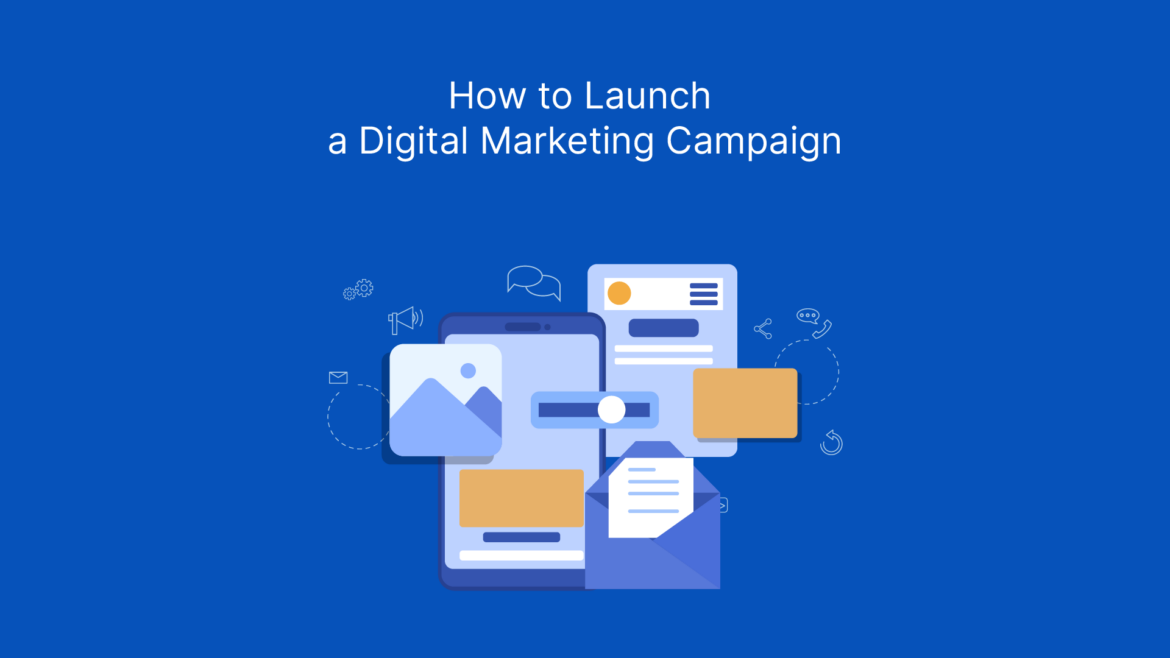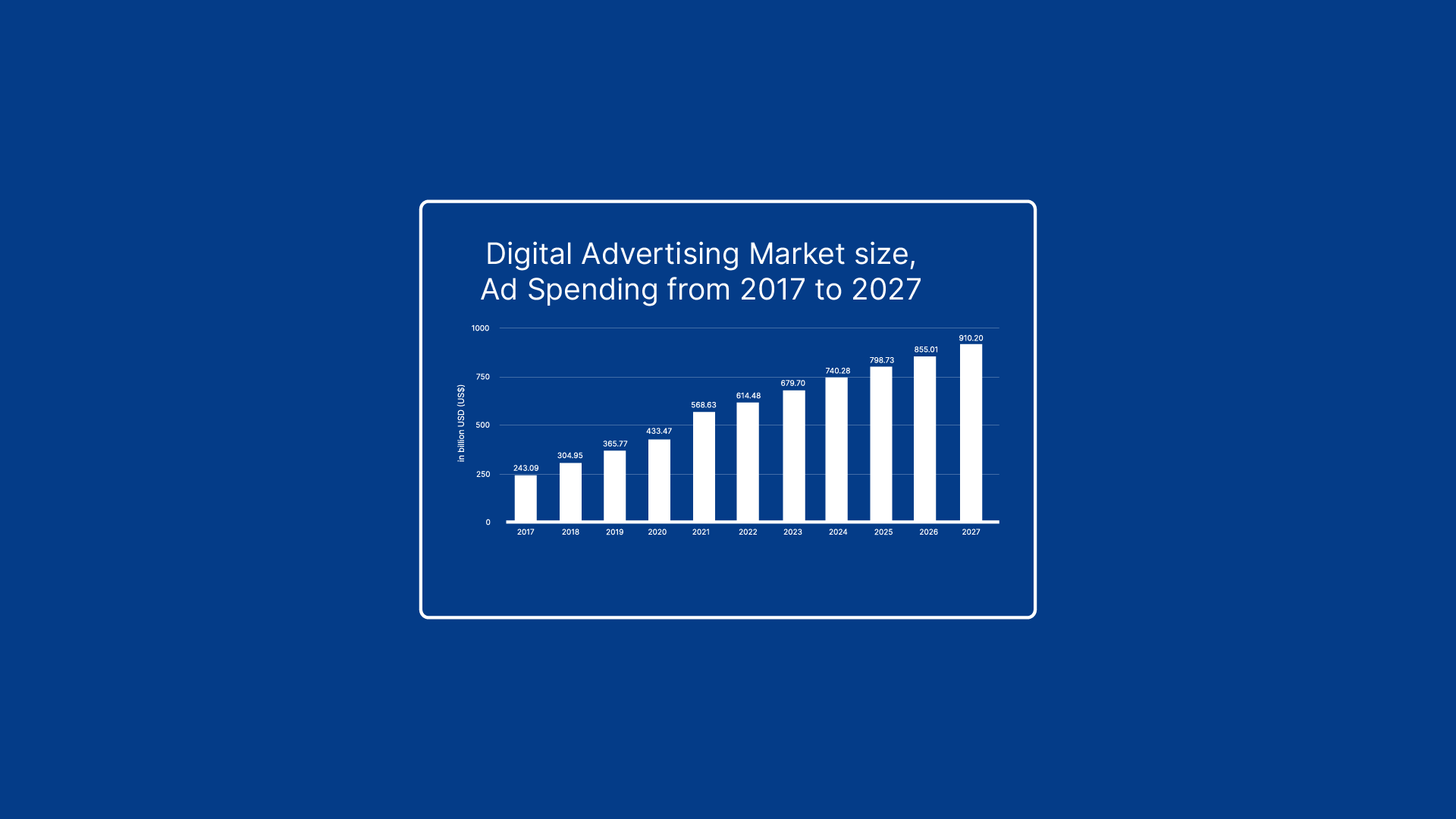|
Getting your Trinity Audio player ready...
|
When it comes to launching a digital marketing campaign you first need to understand how people use the internet. Digital marketing campaigns are a must-have for every business. The digital marketing industry is growing at an exponential rate.
Digital media is a powerful tool that allows businesses to target specific audiences, engage them with relevant content and build long-term relationships with them.
The key to success in digital marketing is creating compelling content that resonates with your audience. A good way to get started is by creating a blog or website.

What is a Digital Marketing Campaign?
A digital marketing campaign is an strategy that involves the use of digital channels where customers engage with a brand to execute your marketing strategy.
The aim of any digital campaign is usually to Improve brand awareness, grow traffic to your site, increase conversions or grow your revenue.
To create and launch a successful digital marketing campaign is not easy, it requires a lot of attention to multiple moving parts.
How do I Launch a Digital Marketing Campaign?
If you're an entrepreneur looking to launch a digital marketing campaign, it's important to understand what you're getting yourself into.
Digital marketing is a very different beast from traditional advertising—there's no one-size-fits-all solution. It's also important to remember that your business is unique, so don't try to follow other people's advice blindly.
To launch a digital marketing campaign, you need to set your marketing goals and identify your target market. You can then carry out keyword and topic research, do market research and competitor analysis, and create a content plan that will help you reach your target audience.
These are the steps you can take to launch a successful digital marketing campaign:
- Define your Target Audience
- Identify your Marketing Goals
- Conduct Keyword Research
- Research your Marketing and Competitors
- Choose your Marketing Channels
- Create Great Content
- Run Test Campaigns
- Monitor and Analyze results
- Allocate more budget to performing campaigns
- Setup Remarketing/ Retargeting Ad Campaigns
1. Define Your Audience
Market research is the first step in launching a digital marketing campaign. You need to identify your target audience or customer, their needs and goals, and the type of content they are most interested in.
Even if you don't have an idea of who your ideal customer is yet, you can still spend some time researching the best fit for your brand or product. There are a number of things to look at to make use of your target audience in the world of online marketing.
When defining who your target audience is consider the following questions.
- Who do you want to reach?
- What type of content would they find interesting?
- How much time do you have to invest in developing your content?
These questions should help you define your target audience. Once you have defined your target audience, You then need to map out how you can reach them through various channels including social media, email marketing, and SEO.
Once you have some idea of who your ideal customer might be, it's time to set your goals for your digital campaign.
2. Identify Your Goals
Once you know who you’re trying to reach, you need to identify what goals you hope to achieve by launching a digital marketing campaign.
When launching a digital marketing campaign you have to set your marketing goals. This way you are not hitting at an empty target, but something you can look forward to archiving.
There is one important thing you should keep in mind when working on your goals. Your marketing goals should be simple, measurable, realistic, and time-bound. They should also align with your overall business objectives.
For instance, if you have an online store, then your marketing goals might be to increase sales, reduce marketing costs, or both. In this case, your digital marketing goals might focus on driving traffic to your site and improving conversion rates with as low a cost as possible.
An example of a SMART goal can be, to reach 1000 visitors per month coming to my website in 3months.
Whatever your target is, it's important that you identify it before you start creating content for the campaign. You can use Google Analytics to help you measure the success of your online campaigns against your key metrics over time.
So, before you even start brainstorming ideas for your campaign, figure out what kind of results you want. Think about your goals and objectives and write them down.
Then think about who your target audience is and write down their needs and wants as well. Once you've done this, consider what kinds of things they'd find valuable or interesting in order to help them accomplish those goals.
- Do you want to increase traffic to your website?
- Increase sales?
- Grow your social following?
Once you have identified your goals, you can begin planning how you will accomplish them. Once you have some idea of who your ideal customer might be and have targets, it's time to create a list of keywords and topics related to those interests with which they might be searching online at any given point in time.
3. Carry Out a Keyword and Topic Research
Once you have identified your target market, you must carry out keyword and topic research so that you can determine what keywords are being searched by consumers online at this point in time. This will help you come up with a list of relevant keywords that can be used in your content marketing strategy.
Once you've determined what terms people are searching for and where they're looking for them (on Google or Bing), it's time to do some competitor analysis so that you can set yourself apart from others in your niche.
To find out more about the keywords that are currently being searched for on Google, check out Google Keyword Planner.
To get the best results in your research you need to use the right SEO software for your research. An SEO software like SEMrush allows you to conduct your keyword research by looking at how people are searching and how often they do.
But why do keyword research? Keyword research will help you uncover some of the best Topics you will use to attract your readers. It doesn't stop at uncovering topics. Whether you are creating an SEO strategy, PPC, email marketing, or social media campaign, keyword research gives you direction.
With keyword research, you are becoming the customer, understanding how they search and what they expect as their results when they are looking for products on search engines.
There are different SEO tools to use to find relevant keywords and set your digital marketing campaign on the right path. See this list of the best content marketing and SEO software you can use.
4. Do market Research and Competitor Analysis
After carrying out keyword research, it is also essential that you carry out competitor analysis to see if there are any existing companies offering similar services as yours.
In addition to this, do some research on how successful these companies are and what strategy they may be using to get ahead.
With your research you will uncover where your target market spends their time. Part of doing competitor research is finding out what has worked for your competitors and find a way to implement that in your digital strategy.
There are several things to look at like, what your competitors are promoting in their digital marketing campaigns and the products popular in your market.
A platform like Buzzsumo can give you these answers by showing you content that's popular. You can also find what you need by doing a google search to see if there are any ads running with the keywords you want to target.
For Facebook research you can find ads running through the Facebook Ad's library which you can search for Ads related to your niche.
5. Choose your Marketing Channels
After carrying out keyword research, it is also essential that you carry out competitor analysis to see if there are any existing companies offering similar services as yours.
In addition to this, do some research on how successful these companies are and what strategy they may be using to get ahead.
With your research you will uncover where your target market spends their time. Part of doing competitor research is finding out what has worked for your competitors and find a way to implement that in your digital strategy.
There are several things to look at like, what your competitors are promoting in their digital marketing campaigns and the products popular in your market.
A platform like Buzzsumo can give you these answers by showing you content that's popular. You can also find what you need by doing a google search to see if there are any ads running with the keywords you want to target.
For Facebook research you can find ads running through the Facebook Ad's library which you can search for Ads related to your niche.
Once you have your main channels in place, it’s time to set your budgets.
As a rule of thumb you should budget at least 50% higher than your actual spend for all digital marketing campaigns. This is because there are a lot of costs that come with running a digital marketing campaign and most of these costs will be incurred regardless of whether or not the campaign works.
It’s important that you set realistic budgets for each channel so that you don’t overspend or under-spend on any particular channel.
This will help you build your brand, get your name out there and build a reputation as an expert in your field. This will also allow you to target the specific audiences that are most likely to engage with your content.
Once you have established yourself, then it’s time to start expanding into other areas of digital marketing. But if you don’t have much money available at this stage then it makes sense to focus on just one or two channels at any given time.
6. Create Compelling Content
You now have a clear idea of who you’re targeting and what you want to gain from your campaign. Now it’s time for you to create content! Start by brainstorming ideas for blog posts, videos, infographics, etc.
Make sure each piece of content is focused on accomplishing one goal. If you’re writing a blog post, make sure it’s not only informative but also shares valuable tips and tricks.
Before launching a digital marketing campaign, you need to create your content assets. This includes everything from images and videos to text articles and blog posts.
You can use these assets across all platforms — including social media, email campaigns, and search engine optimization (SEO) strategies.
How do you create great content for your blog or website? There are plenty of tools out there that claim to help you create amazing content, but they often come at a high price tag.
Content creation has become a major part of marketing strategy for businesses across industries. The demand for quality content has increased dramatically over the last decade. As a result, content creators are now expected to produce more content than ever before.
You need content assets to drive engagement, build authority and promote your brand. Create blog posts, ebooks, whitepapers, infographics, and more.
There are content creation tools available to help you. One example of such is Ai Marketing software to create AdCreatives. You can also use a tool like Canva to create your social media content.
7. Run Pilot Campaigns First
A pilot campaign is a test run of a digital marketing campaign that allows you to gather feedback from potential customers or clients. It's also an opportunity to identify the most profitable channels for your brand.
Pilot campaigns are helpful in determining whether the message resonates with your audience or not. It helps you determine what type of content works best for your brand and its audience.
There are many ways by which you can run pilot campaigns like A/B testing, split testing, or multivariate testing among others. This will depend on which platform you want to test out your campaign on. (e.g., Facebook, Twitter).
Once you have run your test campaigns, decide what works for your marketing strategy and go with it.
8. Monitor and Analyze Your Campaigns Performance
Make sure you monitor your campaigns closely and analyze their performance in terms of traffic sources, cost per click (CPC), conversion rate, and other key metrics. You can also compare these numbers with previous campaigns or benchmarks to see how well your efforts are working.
For example, let’s say you want to analyze the performance of your Facebook Ads or track your keyword positions.
You can pull up a report for each campaign and see how many people clicked on them, how many impressions they got, how much money was spent on those ads and more. The possibilities are endless.
There are also some tools that allow you to track your website visitors as they visit different pages on your site.
This can help determine which pages are getting the most attention and which ones have lower click-through rates (CTR). You can then use this information to optimize each page so that it gets more traffic, leads or sales.
Take a look at what metrics are most important to your company’s success.
For example, if you have an email list that has been built up over time and could be valuable in helping you drive sales, review the numbers on engagement rates and open rates to see if they are improving over time or stagnating. You might also want to look at where your customers are coming from.
- is there a particular region where they tend to sign up or purchase?
- Is there a specific social media channel they prefer?
This kind of analysis will help you create more targeted ads that resonate with your audience and make them more likely to convert into customers.
9. Allocate More Budget to Profitable Campaigns
Once you have determined which channels are profitable for your brand, allocate more budget towards these channels. This might mean increasing spending on YouTube ads or optimizing Facebook ads for higher engagement rates.
The key to success is investing in the right activities. When you're first starting out, you'll need to find a balance between spending money on things that won't pay off and avoiding time-consuming activities that aren't as likely to yield results.
The most important thing to do is allocate more budget to profitable activities. If you want to maximize your ROI (return on investment), then you should optimize your advertising spend by identifying the most profitable channels and campaigns and investing more in those.
This will help you reach your target audience more efficiently, which will increase the likelihood of converting new customers into paying ones.
If your product or service is not profitable, then it won’t be easy for you to gain new customers. The first step that you need to take is to allocate more budget towards profitable activities. This means that instead of spending money on ads with no return, invest in ads that have a good ROI (Return on Investment).
10. Set up Remarketing Campaigns
Remarketing is the process of returning users to your website after they have visited another website or mobile app that has something to do with your business.
These sites can be pages on other websites or apps, but they don't have to be. They could be videos, images, or other content posted on social media.
Retargeting ads are highly effective because they show relevant ads to people who visited your website but haven't converted yet. By showing these ads, you can get them back onto your site and persuade them to convert.
You can also use this technique for retargeting mobile app users who were interested in your product but didn't convert into paying customers yet.
Launch your Digital Campaign
Now that you know how to launch a digital marketing campaign, you're ready to start planning and executing your online marketing strategy.
Remember, it can be a marathon and not a sprint, and there are so many things you need to consider. But it's worth it—if done right, your efforts will pay off with increased sales, better customer engagement and retention, and a reputation as a company that's ahead of the curve.
The takeaway from this is to go all-in with a marketing campaign, and not ignore the potential of digital marketing. Not only can digital marketing boost results for businesses in countless ways, but it's inexpensive and easier than ever before.
Digital is here to stay and the benefits are endless, so don't let the digital marketing possibilities pass you by.







